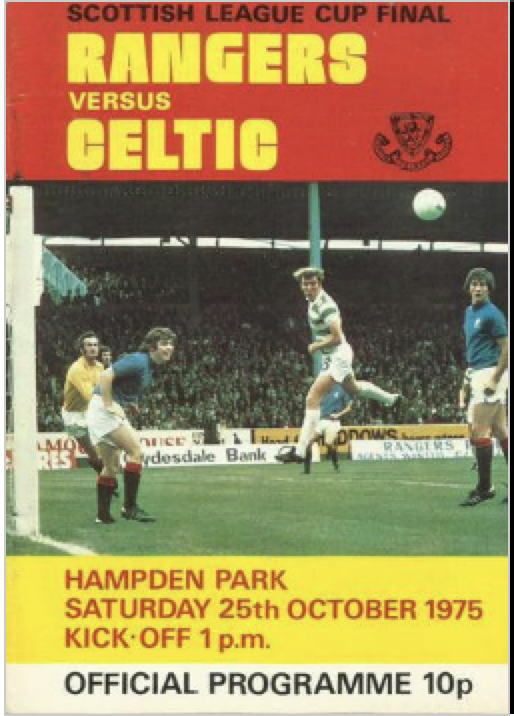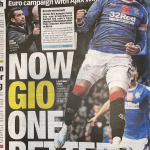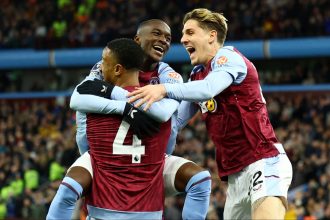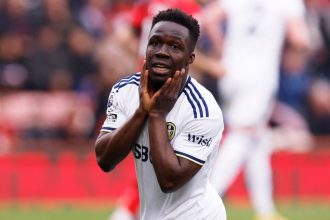RANGERS v CELTIC LEAGUE CUP FINAL PREVIEW
By David Herd
This Sunday, Rangers face Celtic at Hampden in the League Cup Final (I’m too old to give it the title of The Premier Sports Cup). Recent memories of facing our bitterest enemies at the national stadium are less than happy ones, with defeats to Celtic in the finals of both 2019/20 and 2022/23 as well as the Scottish Cup final earlier this year. But despite the horrendous number of times the trophy has ended up in the Parkhead trophy room in the past decade, this is still a trophy that Rangers can claim to have the greater history. It has been lifted by a Rangers captain far more often than by the skipper of any other club, and if James Tavernier – or Jack Butland – hold it aloft this weekend it would be the 29thLeague Cup win for the club. Considering the competition only started 78 years ago, that’s pretty impressive.
Most Read on FollowFollow.com The FollowFollow.com Friday Preview – Hearts at Home Dessers Departs – A look back at Cyriel In The Eye Of The Storm – Rangers 0-0 Celtic
Rangers are the holders, a Tavernier goal enough to see off Aberdeen in the Hampden final last December. A first trophy for manager Philippe Clement, and the first time the unique silver trophy with three handles had been in Rangers’ possession since way back in 2011. That previous winning final in Walter Smith’s last season in charge was the last occasion Rangers defeated Celtic in the final. It’s therefore 13 years since we got the better of them in an Old Firm final, so few supporters under the age of 18 will remember it. A win this weekend will be the first time this new generation of fans will experience the absolute euphoria of beating them in a final. And, as the old expression goes, nothing beats the first time.
The ancient writer of this article has been lucky enough to experience that delight many times. The first time for me, was 1970, that legendary occasion where 16-year-old Derek Johnstone became a lifetime hero to my generation, when he outjumped Billy McNeill and Jim Craig to bullet home a header just before half-time and score the only goal in front of over 106,000 at Hampden. I had the picture of that goal on my bedroom wall for years, along with one of stand-in captain Ronnie McKinnon holding the trophy aloft – regular captain and Greatest Ranger John Greig missed the match through injury. Nobody younger than DJ had ever scored in a major British cup final, and nobody has since. It was a time when Celtic were dominating the Scottish silverware, and few gave Rangers a hope. Maybe it’s a lesson for those writing us off this time.
But despite that 1970 final being my first glorious Rangers memory, I wasn’t at that game. At seven years old, I still wasn’t allowed to go to Old Firm matches which were seen by many parents as too risky for their youngsters. That delirium of being there celebrating a final win over them had to wait. It would be five more years before I would attend a League Cup Final, and in season 1975/76, it would be the first Old Firm final in the competition since that unforgettable DJ day. On Saturday 25 October 1975, I would be in the Rangers End to see if John Greig or Kenny Dalglish would lift the trophy.
The season started with Rangers as Champions, the first time I had ever been able to say that as we had just won our first title since 1964 and prevented Jock Stein’s Celtic from winning 10-in-a-row. We were champions, but Celtic had won both domestic cups, with most agreeing that the trophies in this new campaign could go either way. The League Cup competition had started as it always did in those days with a group stage, with Airdrie, Motherwell and Clyde the teams to face home and away. I was at Ibrox celebrating my twelfth birthday when we faced Motherwell, and also celebrated Greig scoring a thunderbolt from fully 40 yards! I must have thought it a better present than whatever my parents had bought me, as I remember the goal vividly and have no recollection whatsoever of what I had unwrapped that morning. The game ended 1-1, a mistake by goalkeeper Peter McCloy allowing Motherwell to equalise. But Rangers still won the group, which meant they progressed to the quarter-finals, which were played on a home and away basis.
The opposition were Queen of the South, which seemed a guaranteed semi-final place. But after a narrow 1-0 Ibrox win, somehow we contrived to lose the second leg 2-1 and it meant extra-time. My dad was down at Palmerston for the game, but there was no chance I was getting to go, not with school the next day. It was the radio for me, till my bedtime deadline anyway. Back in the days before the internet or 24/7 news, I had to go to bed before knowing the final score, and it was a huge relief when I got told next morning that an Alex MacDonald goal had snatched a draw on the night and a narrow aggregate win. When the draw for the last four kept Rangers and Celtic apart, an Old Firm final was looking inevitable. Rangers seemed to get the prefect draw, a Hampden clash with the minnows of Montrose, who had shocked a very good Hibs team in the quarter-finals. Celtic would play Partick Thistle, meaning neither Old Firm club would face top division opponents.
The Hampden semi-final was my first experience of cup upset panic. I was allowed to go along that Wednesday night, and confidently expected to witness a massacre. By half-time, I was wishing I had been kept at home! After over 40 minutes of struggle, the unthinkable happened. A handball given against Colin Jackson, a penalty for Montrose, and they scored it. There wasn’t a big crowd there that night, but the booing at half-time sounded like 50,000! Montrose very nearly scored again a few minutes into the second half, but thankfully things returned to normality thereafter. Derek Parlane equalised, and from then on, Rangers just steamrollered the underdogs. We won 5-1, and with Celtic beating Thistle it meant we would get the expected final, even if not the expected way.
The weeks leading up to the final were not the preparation you’d want for an Old Firm battle. Jock Wallace’s team went through an alarming run of form, and results were terrible. The following Saturday, I could hardly see a thing in a huge crowd at Somerset Park, but what I did see involved Ayr United giving Rangers a bit of a hammering. We lost 3-0. The following week, we went to Motherwell and lost 2-1, at least I wasn’t there this time. Then in the midweek before the final, Rangers went to France to play St Etienne in the European Cup. Things started badly over there before the game had even started, Peter McCloy injured his hand in the warm-up in a freak accident when trying to save a Colin Stein shot, and had to be replaced by Stewart Kennedy in goal. He did OK, but the French team gave Rangers a torrid night, and the 2-0 defeat could possibly have been worse.
Three defeats in a row, and next up was Celtic at Hampden. Unlike now, cup finals were not televised live and the only way to see it on the day was to be there. But there was something new that day. After trouble at many of the recent matches between the teams, the authorities decided to move the kick-off time forward to 1pm and instruct all shops in the immediate area of the stadium to remain closed till after kick-off. This would mean no carry-outs could be bought, and that the pubs would only just be opening when the crowds were heading inside the ground. The pre-match ritual of a few beers would be denied to the vast majority (it had no effect, of course, on those who preferred to bring a carry-out with them from their home area!) Maybe it was the early kick-off, or maybe it was the reputation for trouble the match had, but for some reason the attendance was massively down on previous finals. The Old Firm had played a Glasgow Cup final at Hampden just five months earlier, and over 70,000 were there in pouring rain for a minor competition. Now, in the final of the first major trophy of the new season, there was just 58,000 inside Hampden. That was almost 50,000 less than the crowd who watched the last final between the teams just five years earlier.
As well as there being many fewer on the terraces, there was also one person missing who should have been there. Celtic boss Jock Stein had been seriously hurt in a car accident a few months earlier, and while he recovered from his injuries, Celtic had their assistant manager Sean Fallon in charge. The referee was a Bill Anderson of East Kilbride, not a man I can remember at all, but he will predictably become part of the story later.
Wallace named this Rangers side, making just the one change from the defeat in France, winger Quinton Young replacing defender Alex Miller:
Stewart Kennedy, Sandy Jardine, John Greig, Tom Forsyth, Colin Jackson, Alex MacDonald, Tommy McLean, Colin Stein, Derek Parlane, Derek Johnstone, Quinton Young. Subs – Bobby McKean, Alex Miller
Meanwhile, Fallon opted for this line-up, which also saw one change from a midweek away match in Europe, when they drew 0-0 in Boavista. Captain Dalglish had missed that match with a knock, he returned to the team and replaced Jackie McNamara.
Peter Latchford, Danny McGrain, Andy Lynch, Pat McCluskey, Roddie MacDonald, Johannes Edvaldsson, Harry Hood, Kenny Dalglish, Paul Wilson, Tommy Callaghan, Bobby Lennox. Subs – Jackie McNamara, Ronnie Glavin
Celtic held a one-point lead at the top of the league table after the recent Rangers slip-ups, and with a game in hand. That in itself was somewhat controversial, as the previous Saturday they had been 2-0 down at home to Hibs and heading for a certain defeat when the match was abandoned with just five minutes to play due to heavy fog. But, regardless of the rights and wrongs of it all, this stroke of luck combined with the wretched results and fortune Rangers were enduring had seen a majority of pundits favour a Celtic win in the big match.
In truth, it was a game that looked like it was between two teams who were out of form and lacking in confidence. And it was one that was massively shaped by a decision made in the Ibrox manager’s office, as Jock Wallace decided on a tactical tweak that was to prove pivotal. He decided that centre back Tom Forsyth would be given a man-marking job on Dalglish, with the intent of utilising the best tackler and most aggressive ball-winner in his eleven to neutralise the threat of the man who was by far Celtic’s most potent attacking threat. It was a plan that worked to perfection. Forsyth had been the goalscoring hero the last time the Old Firm had contested a major final at Hampden, his winning goal in the Centenary Scottish Cup Final of 1973 being the stuff of legend. But to many, including myself, his 1975 League Cup final display was his greatest 90 minutes in a Rangers shirt.
“Jaws” never gave the Parkhead star man a sniff of goal, snapping into the tackle as soon as Dalglish took possession, and using his perfectly legal aggression to knock the Celtic captain completely off his stride. Without their most creative outlet, the Celtic attack found the uncompromising Rangers back line almost impossible to penetrate, giving Rangers the platform they needed to then find a way to break through at the other end. Such was the Celtic frustration, that the first booking administered by Mr Anderson was to Harry Hood for a late challenge on Forsyth after the Rangers man had yet again won the ball.
By half time, it was 0-0 and it already looked like one goal would be enough. There had been a couple of chances. Parlane came close with a header that skimmed the crossbar at one end, and Callaghan did strike the Rangers bar with a fierce shot that had Kennedy beaten. But most inside the ground, including the young me, were enjoying the battle more than the occasional outbreak of football. After the break, Rangers started more positively, and play was gradually becoming more and more towards the Celtic goal. Parlane had another half chance that slipped away, before Forsyth briefly strayed away from Dalglish to challenge Danny McGrain for the ball, but he got there late and his name went into the book. Four minutes later came the moment that made sure Mr Anderson’s name would be in the post-match reports. Forsyth moved in to dispossess Dalglish for the umpteenth time but brought down the Celtic man. In 2024, it would have been a yellow card, and then a red as he was already on a booking. But in 1975, sendings off were relatively uncommon and needed some justification, and the referee gave the Rangers man the benefit of the doubt. With the momentum of the game heading away from them, the Celtic players were livid that they weren’t now playing against ten men. Acting manager Fallon was bouncing around angrily on the touchline, as a number of his players surrounded the official to demand Forsyth be dismissed. Their protests fell on deaf ears, as player protests almost always do.
Most in the Rangers end, and certainly everyone around me, were relatively unworried when Forsyth made his tackle. It wasn’t a particularly bad foul, and a second booking would have been very harsh. At the same time, we all knew the player could not afford any more transgressions and there was around half an hour still to play. But if we were concerned about that, six minutes later it was totally forgotten. I saw my first ever League Cup final goal.
Parlane played a dangerous ball across the Celtic goal from the left of the box which was headed away by Edvaldsson, but the danger was far from over. Quick as a flash, Young on the right delivered the ball back into the middle, and there was the magnificent Alex MacDonald arriving with perfect timing to throw himself at the ball and send a diving header past Latchford and into the net. Cue pandemonium amongst the Rangers support. It was the first time, but certainly not the last, that I would see “Doddie” score a vital cup final goal from midfield. Incredibly, this great Ranger with the heart of a lion and the stamina of a marathon runner, would go on to score cup final goals in 1976, 1978 and 1979 too.
Celtic pushed hard in the time remaining, but that experienced and solid blue wall in front of Stewart Kennedy never really looked like being breached. In fact, the best chance would fall to Rangers, when Parlane saw his shot saved when a pass to the unmarked McLean may have been the better option. As time ticked away, McCluskey became the third and last player booked when his discipline deserted him and he crudely chopped down Forsyth, the man they simply could not better.
The final whistle blew, the Rangers fans celebrated, and Celtic took it as well as they always do. Once John Greig had lifted the trophy to the delight of the masses in the Rangers end of the stadium, it was time for the media to interview the winners and losers. Sean Fallon took little time to dust off the Celtic Book of Excuses. He spoke of how he could not understand why the final had been refereed by a man not on the FIFA list, something nobody at Celtic had mentioned prior to the match. He said that Celtic would be sending off a letter of complaint at the handling of the match, and they would be appealing the two bookings given to Celtic players. And he ended by describing Rangers as “destructive”.
Meanwhile Jock Wallace was unable to hide his delight, and he also had little time for the Celtic complaints. He growled “Tom Forsyth is not a dirty player. He doesn’t go over the ball and he goes for the ball every time. Of course he goes in hard, if he didn’t he wouldn’t be here”. He also then spoke of how his team had shown great character in dominating Celtic after their recent poor results, and that he hoped this was just the first trophy of the season. He would get his wish. After another few poor results, his Rangers team clicked into gear and went unbeaten from early December right to the end of the season. A memorable treble was won, the third in the club’s history and what would be the first of two trebles for Wallace and most of his players.
Since that Old Firm win in 1975, Rangers have won the League Cup a further TWENTY times. That day in October 1975 saw Rangers draw level with Celtic on eight wins in the competition, before then pulling away from them over the years ahead. I have been fortunate enough to have seen all of those subsequent twenty wins, quite a few of which have seen us beat our greatest rivals in the final. That Alex MacDonald goal will forever be special to me, as there really isn’t anything like the first time. But if we were to triumph this Sunday, just maybe my 22nd League Cup final celebration will be the sweetest and most enjoyable of them all. Here’s hoping.








